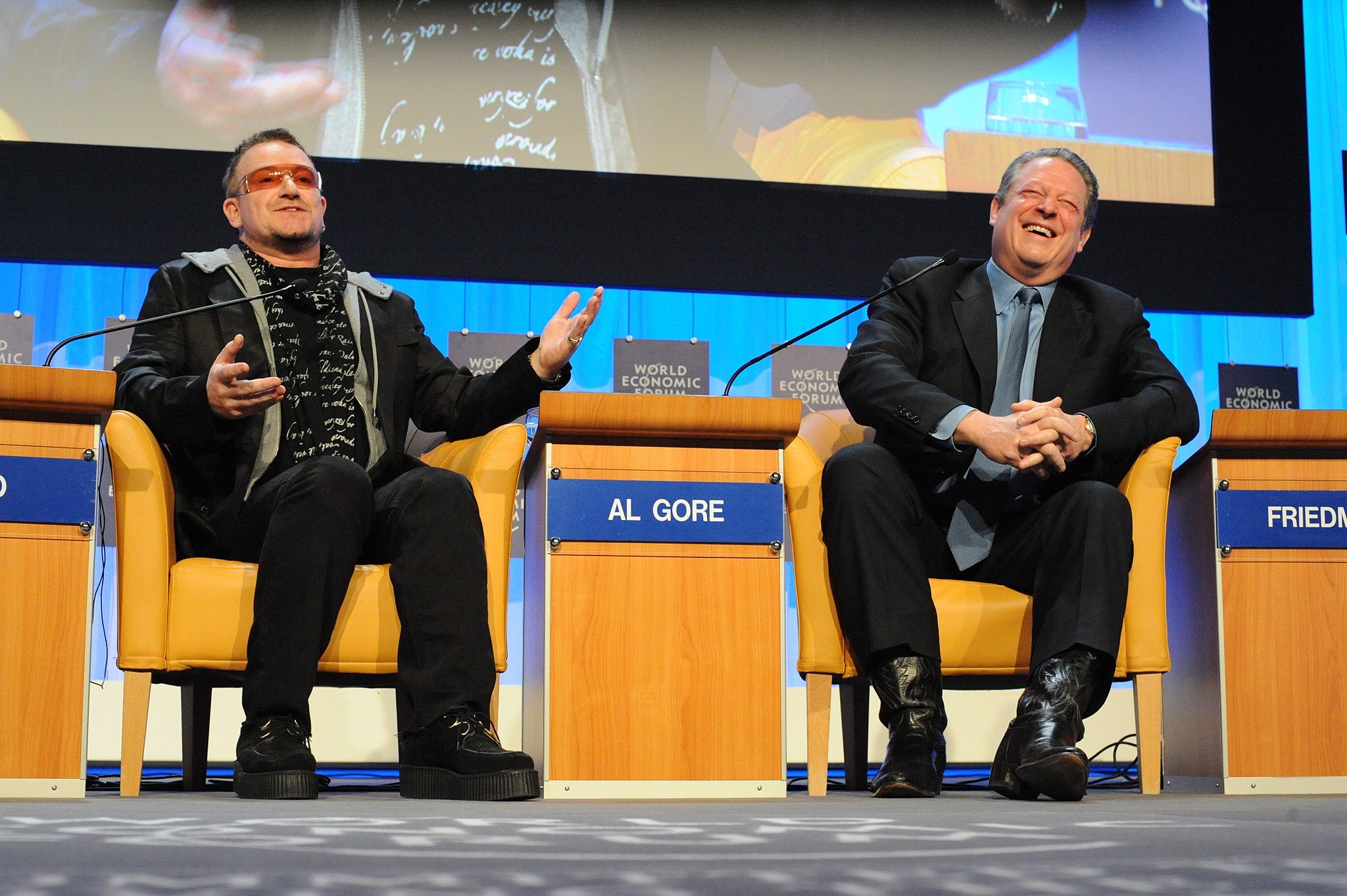Learjet Liberalism
Advocates for climate action should stop defending the rich.

Bono and Al Gore at The World Economic Forum, 2008. Robert Scoble / Wikimedia
Emily Atkin, in an article for the New Republic, has written the latest in a recurring genre of articles defending rich people who advocate for action on climate change. A year or so ago, Vox gave us “Rich climate activist Leonardo DiCaprio lives a carbon-intensive lifestyle, and that’s (mostly) fine”; now, Atkin has set out to establish that “Al Gore’s Carbon Footprint Doesn’t Matter.”
Both of these pieces take on a popular right-wing talking point: rich liberals who live carbon-intensive lifestyles yet advocate for government action against climate change are hypocrites. This, Atkin argues,
is deceitful faux-populism . . . climate change advocates who don’t live a carbon-neutral lifestyle aren’t hypocrites because, for the most part, they’re not asking you to live a carbon-neutral lifestyle. They’re asking governments, utilities, energy companies, and large corporations to increase their use of renewable energy so that you can continue to live your life as you please, without contributing to global warming.
Atkin is correct on one thing: the Left does need to reckon with the “Learjet liberal” rhetoric — but her approach is not the way to do it.
The reason that Rush Limbaugh, Sean Hannity, and other voices on the Right have so much success with this attack is that it contains a kernel of truth: climate change is largely the fault of the rich. As Chancel and Piketty detailed a few years back, the “top 10 percent emitters contribute to 45 percent of global emissions, while [the] bottom 50 percent contribute to 13 percent of global emissions.”
People see Al Gore living a lifestyle that clearly has more of an impact on the world than theirs, and they resent climate change solutions that threaten to make his lifestyle their problem.
Atkin tries to finesse this point by blaming climate change on a series of abstractions — “governments, utilities, energy companies, and large corporations” — but everyone knows that all of these institutions are controlled by the rich. Later, she leans on an argument by David Roberts that the contributions to climate change by individual rich people are insignificant — but this technicality misunderstands the fundamentally classed nature of Learjet-liberal rhetoric. It works not because people necessarily hate Al Gore in particular, but because people generally resent the rich as a class, and are happy to find targets for their anger.
Fortunately for the Left, there’s a simple response to this talking point: reclaim class warfare. The fight against climate change has to be understood as a fight against capitalism. If you leave climate action in the domain of private decision-making, then of course rich people who make decisions to disproportionately pollute are hypocrites when they call for action against climate change. But if you understand climate change as a fight to take personal discretion out of the equation — to abolish private property and place control in the hands of democratic governance — that’s another matter.
Ultimately, Learjet-liberal rhetoric resembles nothing so much as the old right-wing complaint about leftists who use iPhones. If your solution to the problems of our age only involves better personal decision-making in a free market, then yes, there is something inconsistent about crisscrossing the ocean in a private jet or using cheap consumer electronics. But if your solution is to change the system entirely, and to take personal decision-making out of the equation, then it stops making sense to hold your consumption under capitalism against you.